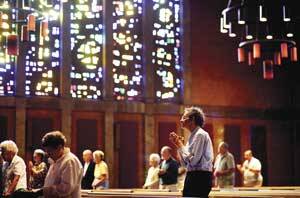Life issues from the test tube to the deathbed are on the agenda for the U.S. Conference of Catholic Bishops’ fall general assembly. The meeting in Baltimore from Nov. 16 to 19 will also include what the bishops hope will be their final consideration of action items related to the Roman Missal. They will also debate and vote on a lengthy document on marriage.
Health care. Up for debate by the bishops is a proposed revision to the directives that guide Catholic heath care facilities. “As a general rule, there is an obligation to provide patients with food and water, including medically assisted nutrition and hydration for those who cannot take food orally,” says the revised text of the Ethical and Religious Directives for Catholic Health Care Services proposed by the U.S. bishops’ Committee on Doctrine. “This obligation extends to patients in chronic conditions (e.g., the ‘persistent vegetative state’) who can reasonably be expected to live indefinitely if given such care,” the new text adds.
Missal. With five votes on the English translation and U.S. adaptations of the Roman Missal, the bishops hope to conclude nearly six years of intense and sometimes contentious consultations. Each section of the missal must be approved by two-thirds of the U.S.C.C.B.’s Latin-rite membership and will then be sent to the Vatican for recognitio, or confirmation.
While awaiting Vatican approval of all sections of the Missal, the U.S. church will begin “a process of catechesis,” said Msgr. Anthony Sherman, executive director of the bishops’ Office of Divine Worship, “so that everyone is ready to move along when we get the final text from the Vatican.”
Marriage. The 57-page proposed pastoral letter on marriage is to be issued in the hope of reversing what the bishops call “a disturbing trend” toward viewing marriage as “a mostly private matter,” with personal satisfaction as its only goal. The letter, called Marriage: Life and Love in the Divine Plan, cites four “fundamental challenges to the nature and purpose of marriage”: contraception, same-sex unions, divorce and cohabitation. Calling both contraception and cohabitation “intrinsically evil,” the bishops say that although couples who use contraception “may think that they are doing nothing harmful to their marriages,” they are in reality causing many negative consequences, both personal and societal.
Archbishop Joseph E. Kurtz of Louisville, Ky., who chairs the bishops’ Ad Hoc Committee for the Defense of Marriage, also will report on efforts to promote and protect marriage as the exclusive and permanent union be-tween a man and a woman.








